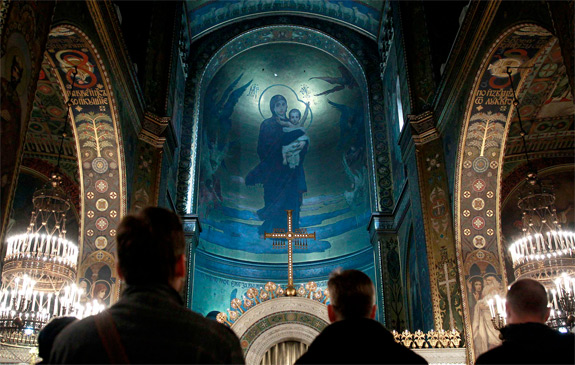

(Information Resource of the UGCC, April 8, 2014). The Synod of Bishops of the Major Archeparchy of Kyiv-Halych published, on April 4, 2014, an Instruction on the conduct of priests of the Ukrainian Greek Catholic Church during political election campaigns. This document contains concrete guidelines for the conduct of the clergy during election campaigns at various levels [i.e. national, regional, local].
As is well known [in Ukraine], a special commission of the Synod of Bishops of the Major Archeparchy of Kyiv-Halych investigated incidents of misuse of the clergy during the 2012 parliamentary election campaign. This prompted the bishops to issue a special document to settle questions about the relation of clergy to socio-political processes, especially in the context of election races. This was done to give clergymen an explanation of the place and role of the Church and of her officials in political and social processes in light of the social doctrine of the Catholic Church.
It is worth noting that the document is composed of two parts: “Theological and canonical principles of Church-State relations” and “Practical pastoral guidelines for pastors”. It stresses that the clergy does not carry out political activity, but instead “both the Church and the state, while considering the clear demarcation of their spheres of competency and clearly respecting their mutual autonomy, are called to collaborate in ensuring the common good.” “A priest has the right to his own civic and political position and to exercise his rights by voting,” the document reads.
According to the Instruction, priests are forbidden to campaign directly for a candidate, a party or a political coalition, and also to mention the name of a person or the name of a political group in that context, because that could influence people to vote for that person or party during the elections. Moreover priests cannot distribute campaign materials in church or on church property, or participate in pre-election activities.
With regard to church liturgies and prayers for fair elections, a priest must receive instructions for them directly from the ecclesiastical authority (Head of the Church, eparchial bishop). The priest can also encourage the people to perform their civic duty according to their own conscience. However he must not accept from candidates or political groups any donations to the church, or toward any other church causes, or toward his personal needs, for which it is necessary to thank the donor publicly.
We might add that the UGCC has never expressed support for specific political groups or individual candidates, but has only formulated general principles in light of the social teaching of the Catholic Church, in order to help voters to make mature, responsible and conscientious decisions on voting day.
UGCC Department of Information
[Translated by Michael J. Miller]
Translator’s notes:
The first part of the Instruction cites the Vatican II document Gaudium et spes, recent papal teaching, the Catechism of the Catholic Church and the Code of Canons of the Eastern Churches. It distinguishes between the Church as the People of God and the Church as served and governed by the ordained hierarchy, which is responsible for maintaining unity in the Church and therefore must not publicly take political positions that might divide the people.
Because parts of Ukraine have been ruled in recent centuries by Russia, Poland, Austria, and the Soviet Union, the Church and the clergy have traditionally been custodians of Ukrainian national identity. In the early 19th century, for example, Father Markiyan Shashkevych (1811-1843), a Ukrainian Greek-Catholic priest, worked for a national and cultural revival in Western Ukraine as an educator, translator, poet, and member of a democratic movement. Chapter 4 of Part One of the Instruction specifically addresses the question of “The UGCC and elections in an independent Ukraine”, a historically rare and still relatively new situation.
If you value the news and views Catholic World Report provides, please consider donating to support our efforts. Your contribution will help us continue to make CWR available to all readers worldwide for free, without a subscription. Thank you for your generosity!
Click here for more information on donating to CWR. Click here to sign up for our newsletter.


